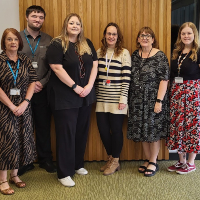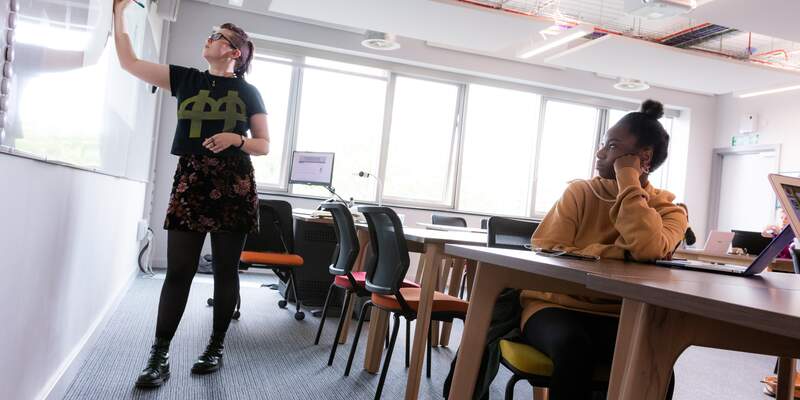View semester dates

BA (Hons) Criminal Justice and Social Policy
Real-world social science with a focus on crime and criminal justice
Year of entry: 2026/27
View semester dates
8th in the UK for Social Policy (including Criminal Justice)
41st in the world for Social Policy and Administration
Through the BA in Criminal Justice and Social Policy course, you will gain an understanding of crime as a social problem. You will also explore this within a wider global framework.
Course content
You will receive a thorough grounding in social sciences and social policy. You'll also study the development of the criminal justice system and the welfare state.
You'll study core modules designed specifically for this course and choose from a wide selection of optional modules developed specially by the School for Business and Society.
Between Years 2 and 3 you have the opportunity to undertake a placement, where you can explore what the work of the criminal justice system looks like in practice.
Year 1
In your first year you'll study a range of core modules that give you a broad introduction to criminal justice and social policy. You will also take a module which will equip you with a range of academic skills to be successful at university.
Core modules
- The Criminal Justice System
- Power, Policy and Social Progress
- Contemporary Issues in Social and Public Policy
- Criminal Justice and Inequality
- Social Evils in the Chocolate City
- Social Harm and Injustice
Academic integrity module
In addition to the above you will also need to complete our online Academic Integrity module.
Year 2
In your second year you'll continue to explore the subjects of criminal justice and social policy in more depth by taking a series of core modules.
Core modules
Year 3
Core modules
Option modules
You will also study four option modules, two from Option List A and two from Option List B. Examples include:
Option List A
- Drugs: Prevalence, Policy and Practice
- Welfare States in Crisis
- Housing and Homelessness: Overcoming Inequality
- Prisons and Penal Policy
- Wellbeing of Children and Young People
- Global Social Problems
- Crime and Justice in the Online Space
- Stigma, Power and Resistance
- Placement
In the summer holiday before the third year starts, you may undertake a work-shadowing placement that lasts around 80 hours. This will allow you to learn from professionals in a field related to crime and criminal justice. Examples of previous placements include: shadowing a criminal barrister, a youth offending team and workers in a drug rehabilitation unit. Watching professionals at work is a completely different learning experience which many students find useful in developing their dissertation and follow in the development of their own careers.
Option List B
- Vulnerability, Deviance and Social Control
- Policing and the Police
- Migration, Immigration and Social Policy
- Gender, Violence and Justice
- Environmental Justice, Harm, and Policy
- Education Policy: Divisions & Inequalities
- Left Behind Places
The options available to you will be confirmed later in the year. For further information please get in touch.
Our modules may change to reflect the latest academic thinking and expertise of our staff, and in line with Department/School academic planning.
Learning outcomes
Every course at York has been designed to provide clear and ambitious learning outcomes. These learning outcomes give you an understanding of what you will be able to do at the end of the course. We develop each course by designing modules that grow your abilities towards the learning outcomes and help you to explain what you can offer to employers. Find out more about our approach to teaching and learning.
Learning outcomes for this course
- Analyse and evaluate social and criminal justice policy to develop informed judgements through a critical understanding of the ways in which social, political, economic and institutional interests shape social problems and societal responses.
- Identify and investigate real world social and crime-related problems and apply problem-solving skills and critical thinking to those issues in order to contribute to imaginative, flexible and effective policy and practice solutions.
- Retrieve, generate, interpret and critically assess qualitative and quantitative data using innovative research methods, digital resources and policy-relevant analytical techniques to investigate social and crime-related questions, assess evidence and produce reasoned written accounts of social and criminal justice policy enquiry.
- Engage in criminal justice and social policy debate at local, national and global level, synthesising complex material and communicating ideas effectively to peers, policy actors, practitioners and client groups across a range of professional settings, both in writing and verbally, using up-to-date visual presentation techniques.
- Work effectively in multidisciplinary teams by acknowledging competing interpretations of social and crime-related issues, and by recognising the value of collaborative and participatory approaches to problem-solving and the shaping of policy solutions while being sensitive to the values and perspectives of others.
- Reflect in depth on the relationship between the key stages in life - namely childhood, adolescence, adulthood and old age - and the bearing they have on criminality over the life course.
- Appreciate the drivers of social inequalities taking into account factors such as class, race, gender, sexuality and the impact of social and criminal justice policy and practice on disadvantaged groups and thus directly contribute to social progress and justice for all members of society.
- Critically reflect upon the enactment of criminal justice policies on practice within the criminal justice system and how such practice can impact on the lives of people subject to them.

I find that Criminal Justice and Social Policy is a degree that requires an inquisitive mind. It’s a comprehensive degree that encourages you to formulate your own perspective.
Fees and funding
The fees and funding information here is for students starting in the 2026/27 academic year.
If you take a year abroad or year in industry you'll pay a reduced rate of fees for that year.
Annual tuition fees
| UK (home) | International and EU |
|---|---|
| £9,535 (TBC) | £26,900 |
The UK government has announced its intention to increase tuition fees from £9,535 to £9,790 for the 2026/27 academic year. We expect this to apply to new UK (home) undergraduate students starting their studies in September 2026.
UK (home) or international fees?
The level of fee that you will be asked to pay depends on whether you're classed as a UK (home) or international student. Check your fee status.
Fees for subsequent years
- UK (home) fees may increase within the government fee cap in subsequent academic years. We will notify you of any increase as soon as we can.
- International fees are subject to increase in subsequent years in line with the prevailing Consumer Price Index (CPI) inflation rate (up to a maximum of 10%).
More information
For more information about tuition fees, any reduced fees for study abroad and work placement years, scholarships, tuition fee loans, maintenance loans and living costs see undergraduate fees and funding.
Funding
We'll confirm more funding opportunities for students joining us in 2026/27 throughout the year.
York, Oxford, Cambridge, Imperial
Just four UK universities are rated Gold for teaching and top ten for research* in the latest national assessment exercises.
* Awarded joint 10th in the Times Higher Education ranking of the Research Excellence Framework 2021.
Teaching and assessment
You’ll study and learn with academics who are active researchers, experts in their field and have a passion for their subjects. Our approach to teaching will provide you with the knowledge, opportunities, and support you need to grow and succeed in a global workplace. Find out more about our approach to teaching and learning.
Teaching format
We emphasise small-group working: you'll mainly be taught in lectures of 50-100 students and take part in seminars of 12-15 people. In the second and third years the lecture groups will be smaller as you begin to specialise.
You'll also take part in group-based workshops and hear from external speakers about the latest issues in policy and practice.
In the UK, full-time students are expected to spend 1,200 hours a year learning. That's about 40 hours of classes and independent study each week during semesters. Everyone learns at a different rate, so the number of hours you spend on independent study will be different to other students on your course.
Teaching location
You will be based in the School for Business and Society which is on Campus West. Teaching will take place at various locations across Campus West, including Derwent and Alcuin.
About our campus
Our beautiful green campus offers a student-friendly setting in which to live and study, within easy reach of the action in the city centre. It's easy to get around - everything is within walking or pedalling distance, or you can use the fast and frequent bus service. Take a campus tour.
Assessment and feedback
You'll be assessed in a variety of ways, with emphasis on continuous assessment. The most common form of assessment is by essay, and you'll be supported with seminar sessions on writing academic essays. You may also be assessed by presentation, group workshop reports, data analysis exercises and portfolios of work. There is minimal use of closed examinations.
Your dissertation will be 8,000 words long and you'll be supported by a supervisor who specialises in the subject you're interested in.
Careers and skills
A high proportion of our graduates are employed within six months. The nature of our degree means you can pursue career-related interests throughout your study and the work-based placement is a useful opportunity to demonstrate your knowledge and skills to future employers.
Career opportunities
Typical career paths in crime and criminal justice systems include:
- Police
- Solicitor or barrister (via Law conversion courses)
- Probation officer
- Prison service
- Courts service
- Government departments and agencies
- Youth offending teams.
See our graduates' careers in roles around the world
Transferable skills
- Communications skills
- Critical thinking
- Data analysis
- Time management
- Project management
- Independent study and research
- Teamwork skills.

This course goes beyond the classroom and provides you with an insight into social policy in action. The teaching is second to none. It gives you the knowledge you need to pursue a career in the social policy field.
Entry requirements
| Qualification | Typical offer |
|---|---|
| A levels | BBB |
| Access to Higher Education Diploma | 21 credits at Distinction and 24 credits at Merit or higher |
| BTEC National Extended Diploma | DDM |
| European Baccalaureate | 75% overall |
| International Baccalaureate | 31 points overall |
| T levels | Merit overall including grade B in the Core in the following T Level subjects: Accounting; Design and Development for Engineering and Manufacturing; Design, Surveying and Planning for Construction; Digital Business Services; Digital Production, Design and Development; Digital Support and Services; Engineering, Manufacturing, Processing and Control; Finance; Health; Healthcare Science; Legal Services; Maintenance, Installation and Repair for Engineering and Manufacturing; Management and Administration; Marketing; Science |
| Scottish Highers / Advanced Highers | Scottish Highers - BBBBB Advanced Highers - not required for entry We may also be able to consider three Advanced Highers or a combination of Highers and Advanced Highers, where an applicant does not meet the grade requirement through Highers alone. Please contact us to discuss your qualifications. |
| International foundation programme | Foundation Certificate from our International Pathway College or an appropriate alternative. |
| Other international qualifications | Equivalent qualifications from your country |
Alternative offers
Meeting the following additional criteria may qualify you for an alternative offer.
| Criteria | Adjustment |
|---|---|
| Widening participation | BCC This is conditional upon successful completion of the WP programme including the YorJourney module (Black Access Programme, Next Step York) or successful completion of Realising Opportunities More about widening participation. |
| Contextual offer | BBC |
| EPQ | If you achieve C or higher in the EPQ, you may be eligible for an alternative offer up to one A level grade (or equivalent) below our typical offer. |
| Core Maths | If you achieve B or higher in Core Maths, you may be eligible for an alternative offer up to one A level grade (or equivalent) below our typical offer. |
| MOOCs | If you successfully complete our online course From crime to punishment, you may be eligible for an alternative offer up to one A level grade (or equivalent) below our typical offer. Details about how to evidence completion of the MOOC will be sent in your offer letter. Please note: you do not need to pay for the certificate. More about MOOCs. |
English language
If English isn't your first language you may need to provide evidence of your English language ability. We accept the following qualifications:
| Qualification | Minimum requirement |
|---|---|
| IELTS (Academic) | 6.5, with a minimum of 6.0 in each component |
| IB English | A score of 4 in English A or 5 in English B (Higher Level or Standard Level) |
| Cambridge CEFR | 176, with a minimum of 169 in each component |
| Oxford ELLT | 7, with a minimum of 6 in each component |
| Oxford Test of English Advanced | 136, with a minimum of 126 in each component |
| Duolingo | Integrated subscores: 120 overall, with a minimum of 105 in each component |
| GCSE/IGCSE/O level English Language (as a first or second language) | Grade C / Grade 4 |
| LanguageCert SELT | B2 with a minimum score of 33/50 in each component |
| LanguageCert Academic | B2 with a minimum score of 33/50 in each component |
| Kaplan Test of English Language | 478 Main Flight score with 444 in each component |
| Skills for English | B2: Merit overall, with Pass with Merit in each component |
| PTE Academic | 61, with a minimum of 55 in each component |
| TOEFL | 87 overall, with a minimum of 21 in each component (taken before January 2026) 4.5 with 5 in Listening and 4.5 in each other component (taken after January 2026) |
| Trinity ISE III | Merit in all components |
| Other English language qualifications | We also accept other English Language qualifications, including various school-leaving certificates. |
For more information see our undergraduate English language requirements.
If you haven't met our English language requirements
You may be eligible for one of our pre-sessional English language courses. These courses will provide you with the level of English needed to meet the conditions of your offer.
The length of course you need to take depends on your current English language test scores and how much you need to improve to reach our English language requirements.
After you've accepted your offer to study at York, we'll confirm which pre-sessional course you should apply to via You@York.
Next steps
Contact us
Get in touch if you have any questions

Discover York








